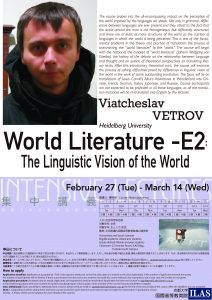
Graduate School of Letters invited Professor Viatcheslav Vetrov to give lectures titled “World Literature – The Linguistic Vision of the World” from Feb 27 to Mar 14, 2018, which is designated to improve English skills by Kyoto University Institute for Liberal Arts and Sciences (ILAS).
Outline and Purpose of the Course;
The course probes into the all-encompassing impact on the perception of the world imposed by the languages we speak. Not only in grammar, differences between languages are ever present and they attest to the fact that the world around the man is not homogeneous, but differently structured, and there are at least as many structures of the world as the number of languages in which the world is being perceived. This is one of the fundamental problems in the theory and practice of translation: the process of transmitting the “world literature” to the “world.” The course will begin with the history of the concept of “world literature” (Johann Wolfgang von Goethe), the history of the debate on the relationship between language and thought and an outline of theoretical perspectives on translating literary texts. After this introductory theoretical part, the course will examine the process of solving difficulties posed by differences in linguistic vision of the world in the work of some outstanding translators. The focus will lie on translations of Lewis Carroll’s Alice’s Adventures in Wonderland into Chinese, French, German, Italian, Japanese, and Russian. Course participants are not expected to be proficient in all these languages, as all the translation instances will be re-translated into English by the lecturer.
[Instructor]
Prof. Viatcheslav Vetrov
Distinguished Visiting Associate Professor, Kyoto University
Assistant Professor at the Sinology Department of Heidelberg University
[Date & Time]
I & II : Feb 27, 13:00-14:30、14:45-16:15
III & IV : Feb 28 , 13:00-14:30、14:45-16:15
V & VI : Mar 1, 13:00-14:30、14:45-16:15
VII & VIII : Mar 5, 13:00-14:30、14:45-16:15
IX & X : Mar 6, 13:00-14:30、14:45-16:15
XI & XII : Mar 12, 13:00-14:30、14:45-16:15
XIII & XIV : Mar 13, 13:00-14:30、14:45-16:15
XV : Mar 14, 13:00-14:30
[Venue]
Classroom 22, Seminar Room, ILAS Bldg, Yoshida-South Campus
[Programme]
I.
The history of the concept “world literature”, transmitting “world literature” to “the world”, introduction into the theory and practice of translation, George Steiner After Babel, Lawrence Venuti The Translator’s Invisibility.
II.
Language and Thought: clearing the debating positions, from Wilhelm von Humboldt to Jürgen Trabant.
III.
Walter Benjamin, “The Task of the Translator” and the paratexts (prefaces, after-words, commentaries) to Lewis Carroll’s Alice as well as to some of the most famous translations of this work: Zhao Yuanren 趙元任, Vladimir Nabokov, Christian Enzensberger.
IV.
Making sense of nonsense, the translatability of nonsense, Roman Jakobson “On linguistic aspects of translation”. Translations of Alice, Chapter I.
V.
Language and reality, denotations and connotations. Roger W. Holmes “The Philosopher’s Alice in Wonderland”. Translations of Alice, Chapter II.
VI.
Language and Gender. Mario Wandruzska, chapter on linguistic genus from Languages: Comparable and Incomparable, Translations of Alice Chapter III, the focus of the discussion: Why does the mouse change its gender? (The session will also examine the issue of gender in poetry: Heinrich Heine, Li Bai, Du Fu.)
VII.
Language Pragmatics, the language of Im/Politeness, translations of Alice Chapter IV, the focus of the discussion: Don’t be particular – The progression of impoliteness in Alice and in the translations of Alice.
VIII.
Translations and the issue of cultural domestication, translations of Alice Chapter V, the focus of the discussion – parodies on poetry by Lewis Carroll and their translatability (the session will also include a broader issue of poetry and its cultural context, the translatability of this context, on the examples of Goethe, Dante and Bulgakov.)
IX.
Puns, paronomasia and the strategies of translating them, translations of Alice Chapter VI.
X.
The art of metaphor, the focus of the discussion: what is the literary sense of the word? Lewis Carroll “Feeding the Mind”, translations of Alice, Chapter VII.
XI.
On in/definite articles, numbers and measure-words: the necessity of a linguistic choice in the act of translation, the focus of the discussion: “A cat may look at a king”, translations of Alice, Chapter VIII.
XII.
Tempora mutantur…The challenge of language tempus in the act of translation. The focus of the discussion: “That’s nothing to what I could say if I chose”, translations of Alice, Chapter IX.
XIII.
The language of children and its logic. Kornej Čukovskij From Two to Five. The images of childhood in world literature (Maurice Maeterlinck, Cao Xueqin 曹雪芹, Charles Dickens.) Translations of Alice Chapter X.
XIV.
The language of violence: breaking linguistic rules. Translations of Alice, Chapters XI and XII.
XV.
Critical voices: a discussion of reviews of translations of Carroll, Dante and Goethe. The art and logic of writing reviews.
[Registration & Fee]
Registration deadline :
Application is accepted by 17:00 of the day one week prior to the first class date in each course. It is treated as the class registration.
Application procedure:
Accepted only via emails. Applicants are requested to send an email titled “Application for Intensive Lecture” to apply[at]mail2.adm.kyoto-u.ac.jp.
In the email body, please write your student ID number, faculty/graduate school, grade, name and title of the course that you would like to register
[Flyer]
See the attached file
Flyer_viatcheslav vetrov
[Contact]
Office for Promotion of International Exchange(OPIX)
Graduate School of Letters, Kyoto University
E-mail: bun.kokusaikoryu[at]mail2.adm.kyoto-u.ac.jp



